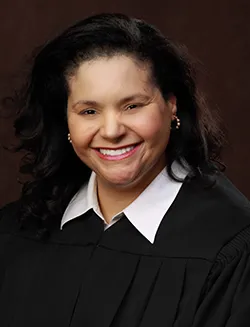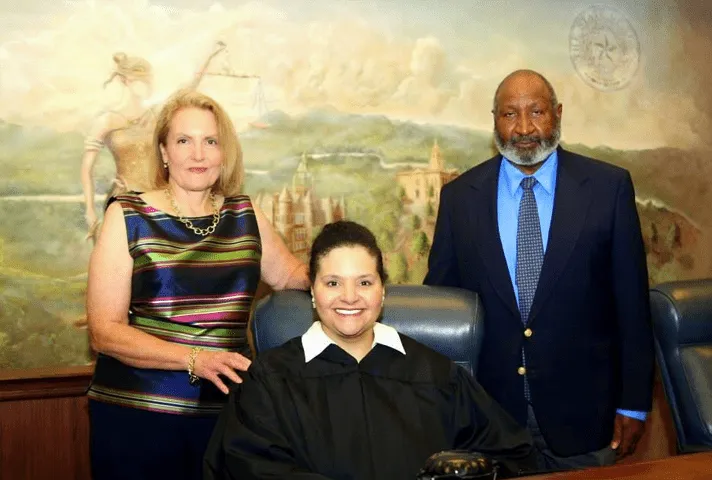
U.S. District Judge Ada E. Brown of the Northern District of Texas
Society hasn’t always had an easy time understanding Judge Ada E. Brown’s multiracial heritage. Born to a white mother and Black father, both with Native American roots, she said people were often perplexed when encountering her multiracial family.
“On numerous occasions, while growing up, people assumed that when I was with my mother and/or my father that we were not all together,” Brown said. “It’s a strange feeling to have a hostess try to seat you separately when you’re out for lunch with your mom or dad. All in all, I think the experiences I had growing up helped make me more attuned to different cultures and shaped my passion for helping others.”
Brown is the first woman of African American heritage to serve as a district judge in the Northern District of Texas, in the over 140-year history of the court. She also is one of just a handful of individuals with Native American ancestry to ever become a federal judge. Inspiration from her mentors, and seeing others with similar backgrounds do great things, encouraged Brown to dream big.
“I have been lucky to have had many mentors in my life,” she said. “My mentors come from all races, ages, and backgrounds. I have learned to listen, watch, and grow from the stories of my mentors and from their advice. I credit my success, in large part, to following the sound advice of my mentors.”
In observance of Native American Heritage Month, Brown reflected on her experiences growing up in a racially and culturally diverse family.
A member of the Choctaw Nation, from her mother’s side, Brown attended pow wows and other tribal events as a child and is still involved with the tribe today.
However, her father’s tribe, the Muscogee (Creek) Nation, no longer recognizes her family as members. Even though the family can trace its history back to when they were enslaved by a Creek Indian, the tribe revoked membership for former slaves in 1979.
“I grew up with my father making all the traditional Creek meals and even speaking some Creek,” Brown said. “It was mindboggling for me to learn how his membership could be revoked after generations of shared culture.”
In the 1970s, interracial marriages were still very uncommon, so her parents prepared her from an early age for the possible bigotry she might face due to her heritage. They also shared stories about the challenges they faced as a couple, and the opportunities that were withheld from her father because of the color of his skin.

Judge Ada Brown with her mother and father.
“My dad worried that I’d face the same kind of hate that he had faced growing up in the segregated South,” Brown said. “His concerns only encouraged me to work that much harder. I was determined not to let anyone decide what I could and couldn’t do.”
The high-achieving Brown was intent on making every one of her aspirations a reality. She was captain of her high school dance team, was elected class president twice, became fluent in both French and Spanish, and graduated as a valedictorian. After high school, she graduated with high honors from Spelman College, and earned a law degree from Emory University.
She went on to have a successful career as both a civil and criminal litigator, and as a Texas trial court judge and an appellate judge, before being confirmed to the federal bench in 2019.
Brown is proud to continue in her family’s long history of service in the law. One of her ancestors was a Choctaw Lighthorseman, a roving law enforcement officer for the tribal government. Another relative worked as a court reporter in an Oklahoma state court. And that court reporter’s son became a state district judge in New Mexico.
“I feel honored, and proud to serve on the federal bench,” she said. “I make sure to show respect to everyone that comes before the court. Whatever the outcome of a case, I want both parties to feel that they had a fair trial and that their stories were heard.”

Ada Brown is sworn in as a federal judge as her parents look on at the federal courthouse in Dallas.
On occasion, Brown has seen the ugliness of racism firsthand. She was once refused service while dining with her African American sorority sisters in Georgia and had an elderly state judge in New Mexico use a Black racial slur in front of her, not realizing that she was of African American heritage.
“There are still problems in the world, but things are definitely better than they used to be,” Brown said. “My dad had it much harder; he faced more overt racism and segregation than I have. I’m thankful for the all the changes that have taken place since my father’s experience growing up in the 1950s. Those changes have helped me get to where I am.”
Today, when Brown isn’t hearing cases on the federal bench in Dallas, she spends her time mentoring young people through internships that she offers to high school, college, and law students.
“It was my mentor Doris Downs, a Georgia superior court judge, that really made me feel that being a judge was within my reach,” Brown said. “It was great to see a brilliant woman doing justice each day. I hope when young people see me and talk to me, they know they too can become a judge someday, or whatever else they dream to be.”
Brown frequently invites the children of courthouse staff to meet her in person. She talks to the children she meets about their aspirations and has them don her robe to see what it feels like to sit on the bench.
“I think it is one of my many roles as a judge to help inspire the next generation,” Brown said. “Young people need to believe they really can achieve their dreams, and sometimes hearing someone in my position say, ‘You can do it’ makes all the difference.”
Subscribe to News Updates
Subscribe to be notified when the news section is updated.
